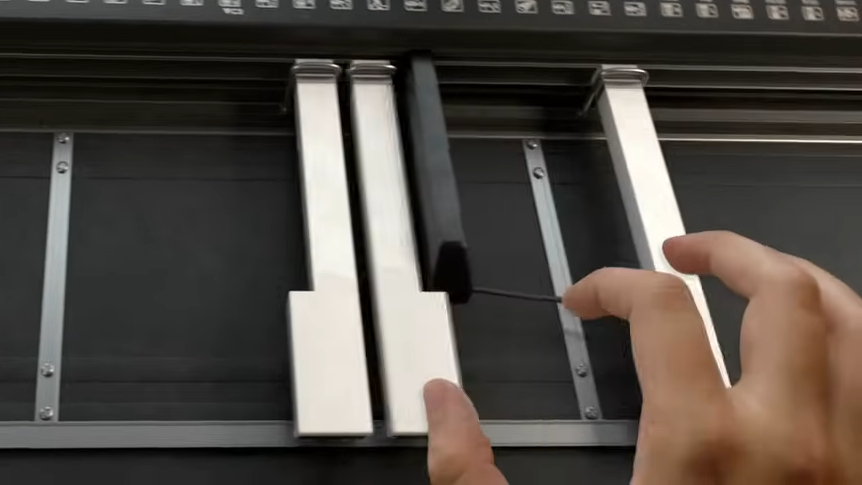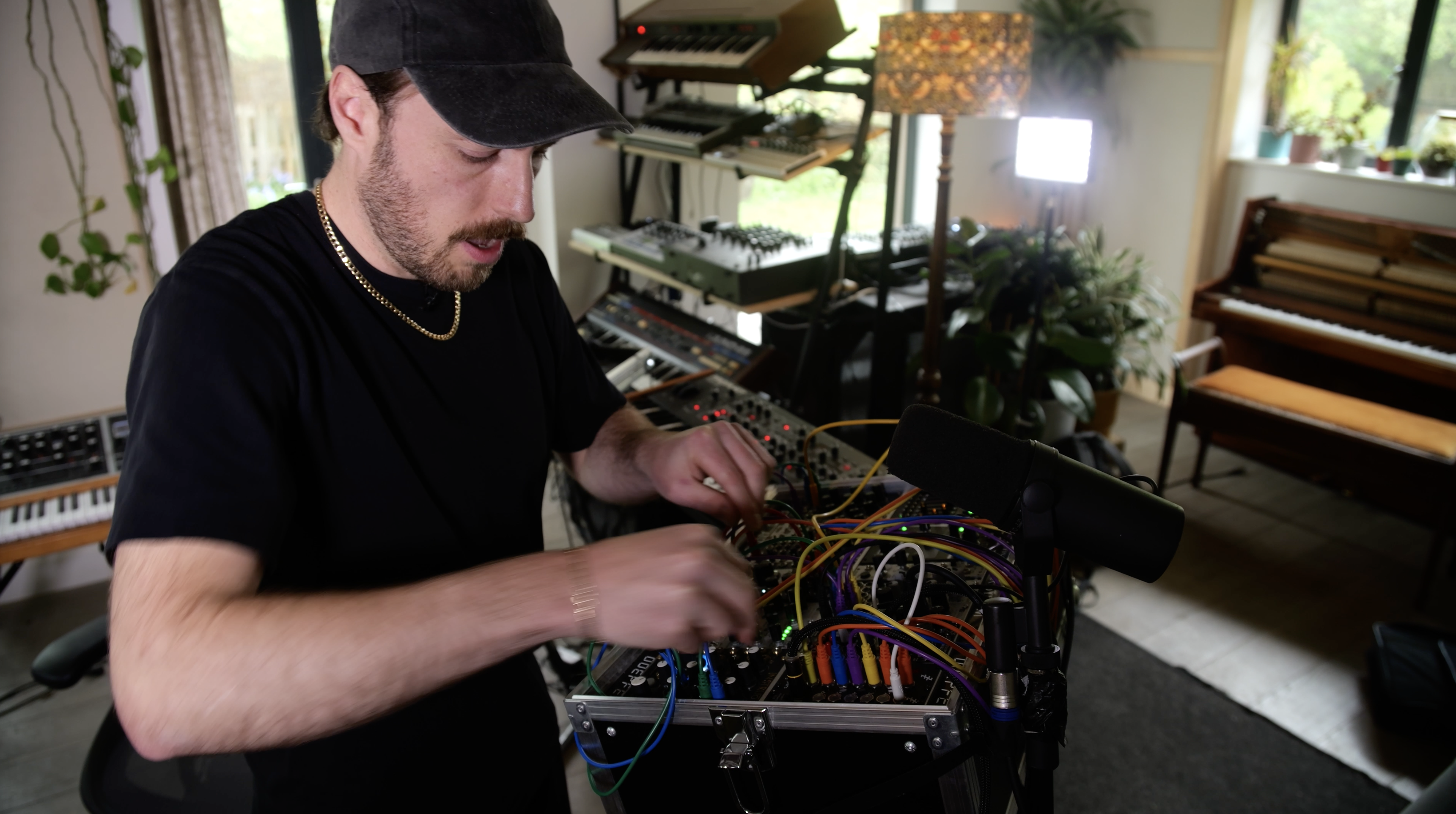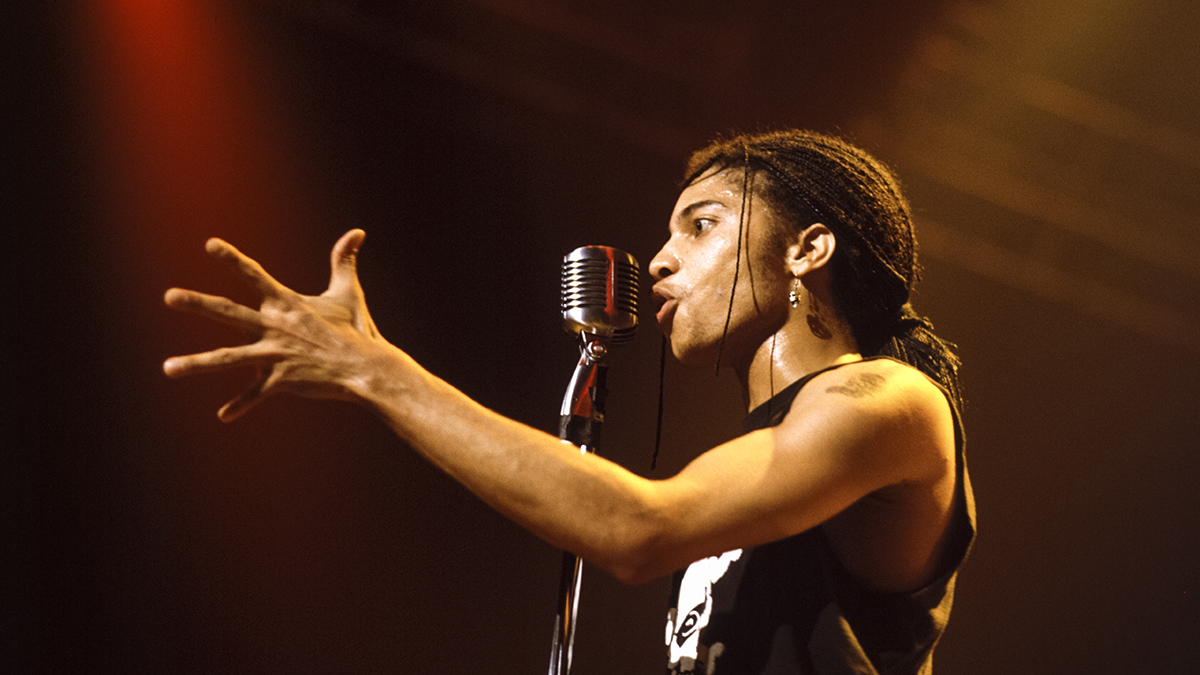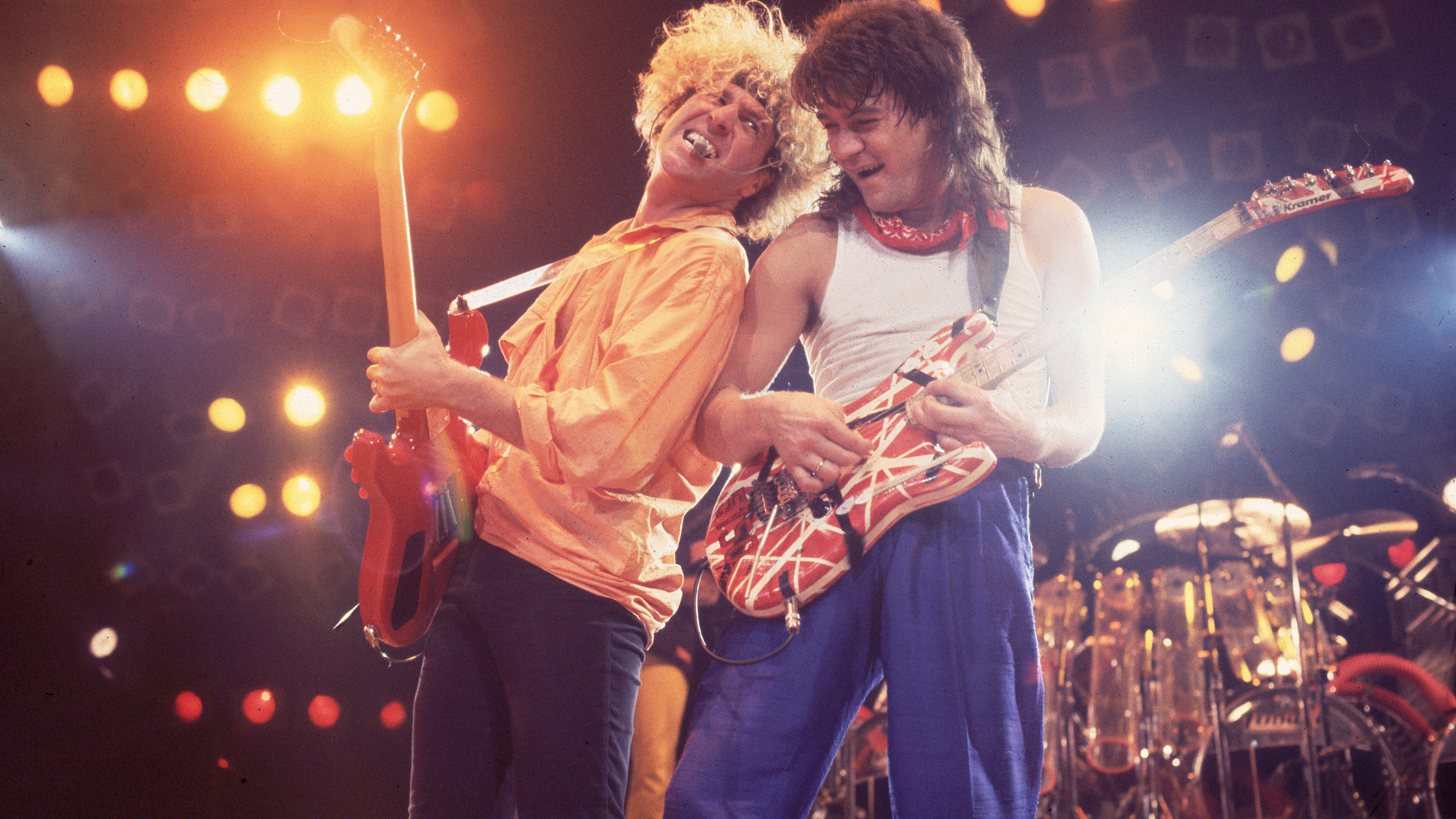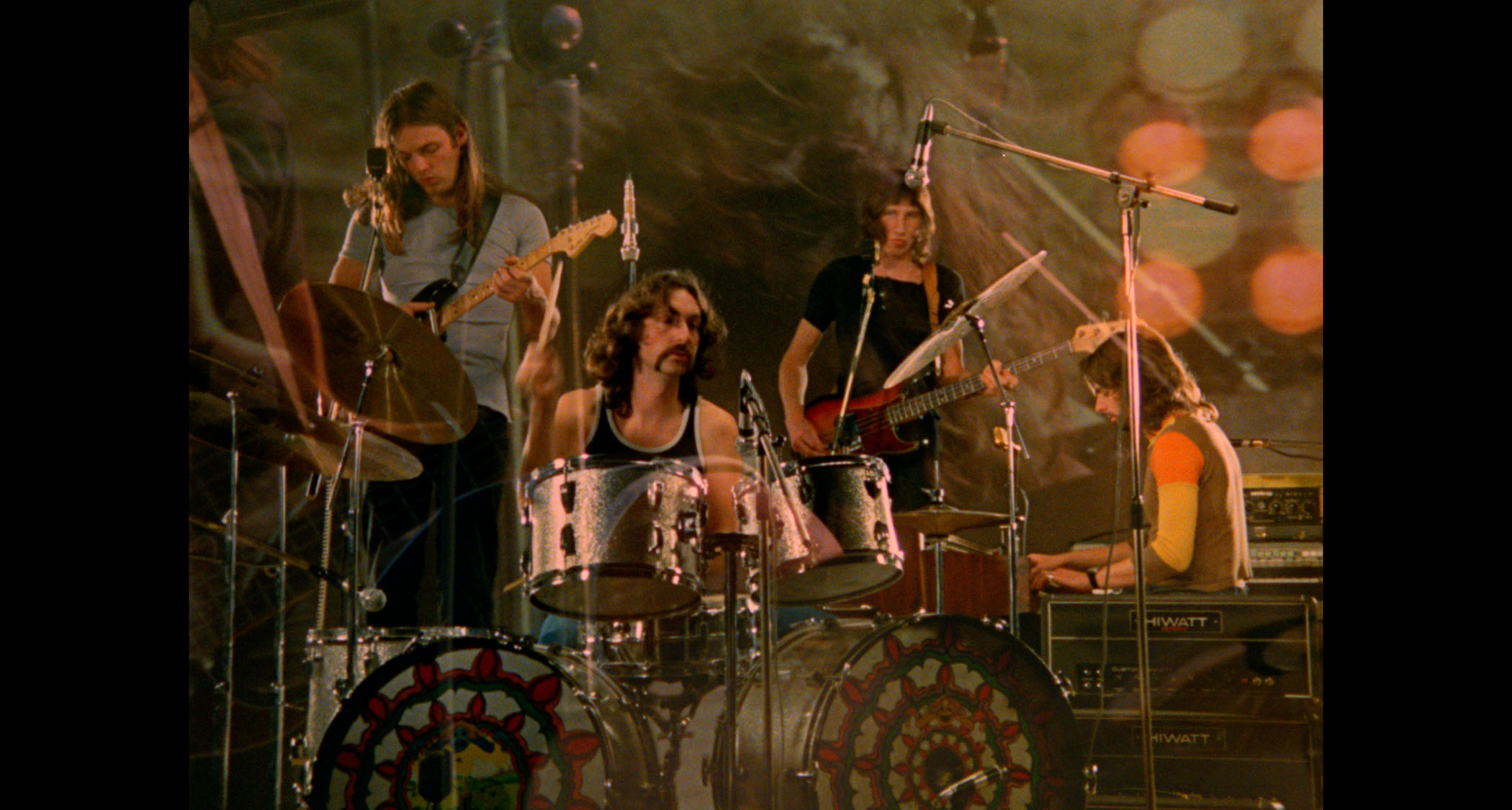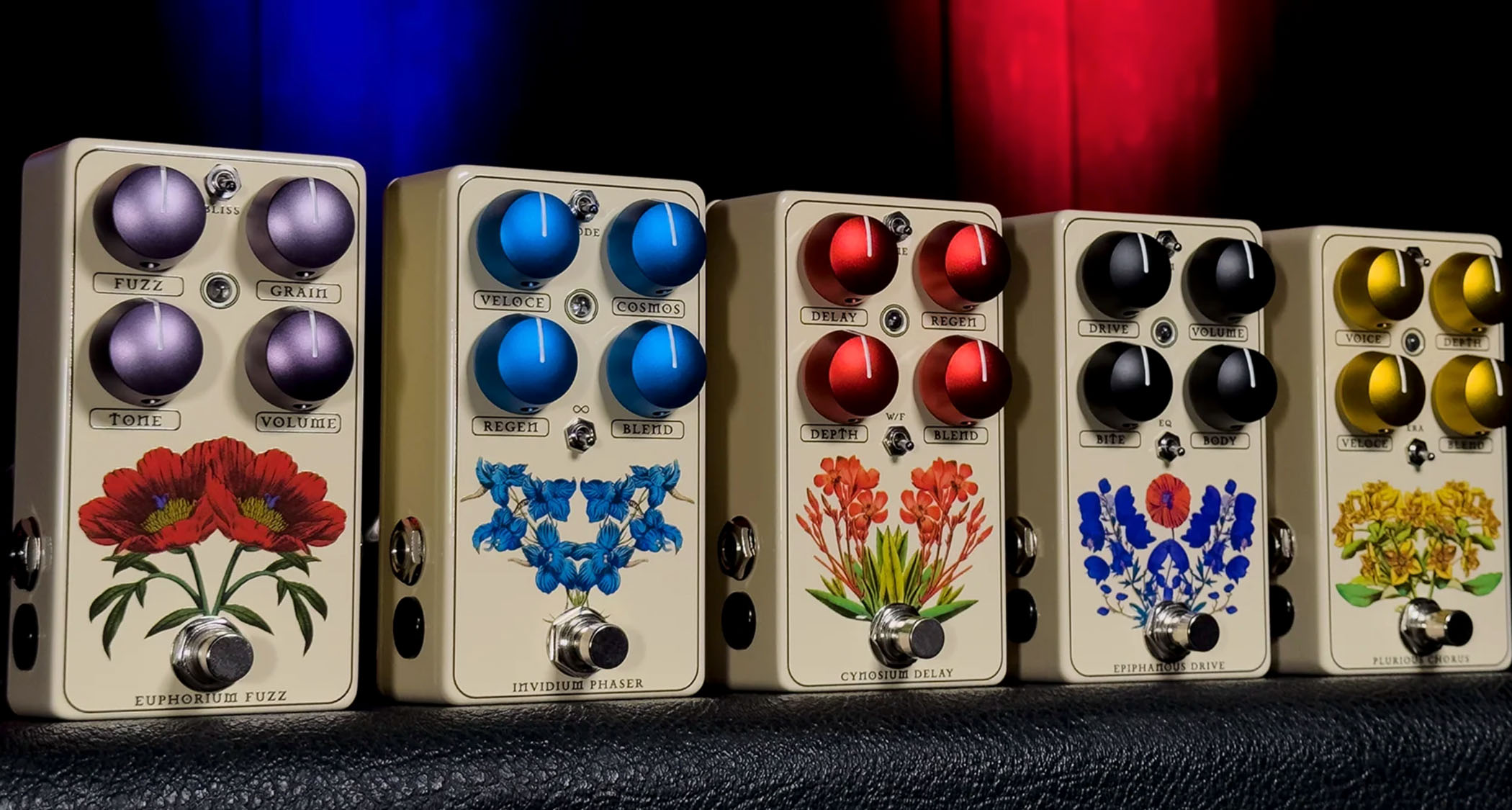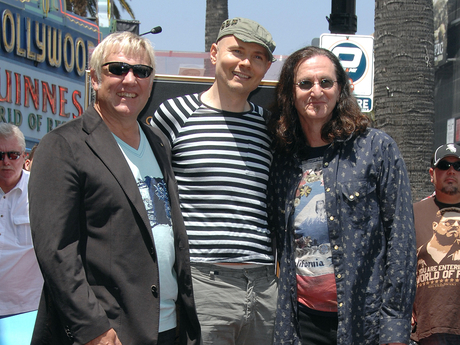
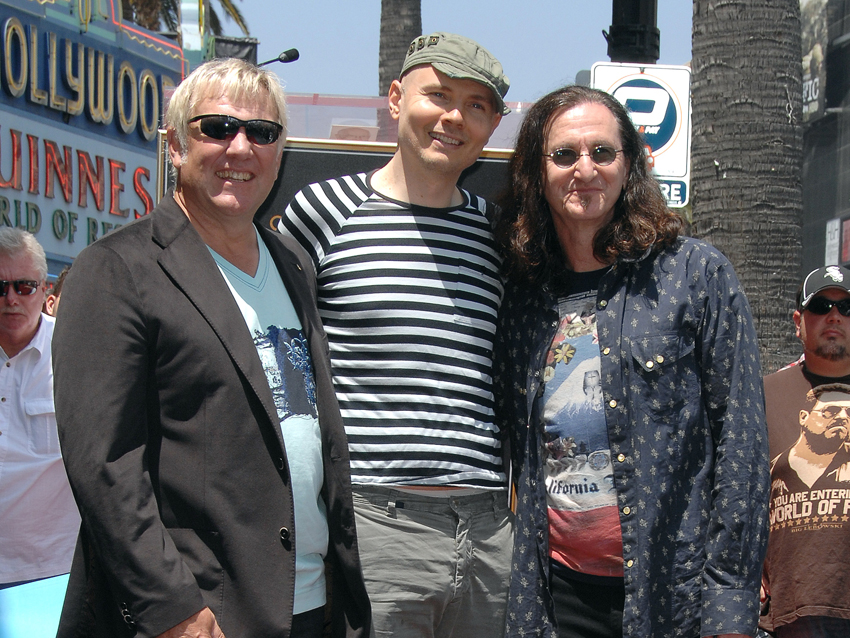
In a wide-ranging interview with MusicRadar, Billy Corgan (center) and Geddy Lee (right), seen here with Lee's Rush mate Alex Lifeson, talk about the merits - and challenges - of the album as art form. © RD / Scott Kirkland / Retna Di/Retna Ltd./Corbis
Part two of our exclusive Billy Corgan and Geddy Lee interview
Geddy Lee on his five favourite bassists
It's a good time to be Geddy Lee, and it's also a good time to be Billy Corgan. Within a week of each other, both artist's bands, Rush and The Smashing Pumpkins, have released albums (Clockwork Angels and Oceania, respectively), that stand among their finest work.
Significantly, both albums break the mold for Music Business 101 in 2012 in that they're concept pieces - Clockwork Angels is a self-contained narrative, while Oceania is part of the Pumpkins' adventurous Teargarden By Kaleidyscope project. That both groups, Rush and The Smashing Pumpkins, have hit creative highs while rejecting the notion that 'the hit single is king' was the starting point for a discussion MusicRadar recently had with Lee and Corgan in which the two talked about how they navigate through the murky waters of the music business and rise to the challenges of what Corgan calls the "iPod era."
It's a fascinating conversation, and what follows is Part One of our interview:
You've both released albums that can be appreciated from beginning to end - that right there is a concept. Do you feel as if you're somehow attempting to revitalize a format that others are discarding? Or is it more a way to revitalize what the band is doing?
Geddy Lee: "I don't think we look at it as revitalizing a thing outside of the band. To me, it's just dependent on what ideas you have cooking and what you want to accomplish - for us, between the three of us. It seemed, at this stage, we were chomping at the bit to do something a bit more ambitious and to see if we could stretch out and tell a story in a longer form. We didn't set out to do an album that was 66 minutes long. [laughs] That's kind of the way it ended up.
"But it was also really important that these songs not only be a concept and tell a story in a sort of rock opera tradition, but stand out as individual songs, and that's really the trick and that's the tough part, to make them make sense in the context of each other but also stand as individuals. From my point of view, it's not so much a concern for the medium as a personal kind of band goal."
Get the MusicRadar Newsletter
Want all the hottest music and gear news, reviews, deals, features and more, direct to your inbox? Sign up here.
Billy Corgan: "Yeah, well, typical me, I said I wasn't going to do albums anymore because I was just so sick of making them, and I could just tell from the audiences, they weren't listening to them. And, of course, the minute I complain about that, some jerk would invariably Tweet, 'That's 'cause you don't make good albums anymore.' But I saw in the culture where the interest in the form was waning.
"That said, it's still an effective way to create some sort of message. It doesn't have to be a message like 'We love the album.' It's just a way to create a cohesive statement. And even to just put walls on yourself, to focus yourself to say, 'Can we come up with an hour of music that's worth listening to in an iPod era?'… You know, the minute you get to the long interlude, somebody's going to hit the 'next' button.
"So we've kind of re-evaluated from that standpoint. I've been getting these softball questions where people say, 'Do you think the album's back?' And I'm saying, 'No, I think it's kind of on its last legs.'
"I've been saying for a while, that what we used to think of an album as a reason to put this music together and focus everybody on the moment. I still think it has to morph into a different form with either visuals or some other multimedia aspect to get people to actually appreciate the work in it - if you want that. If you're just going to create an album of singles, then I guess you don't care.
"It's hard when you deal with tone and texture and context, because oftentimes I'll leave really good songs off an album because they just won't fit, because you want to tell this other kind of story. Once you see that being diminished, it's really sad because so many times those are my favorite songs."
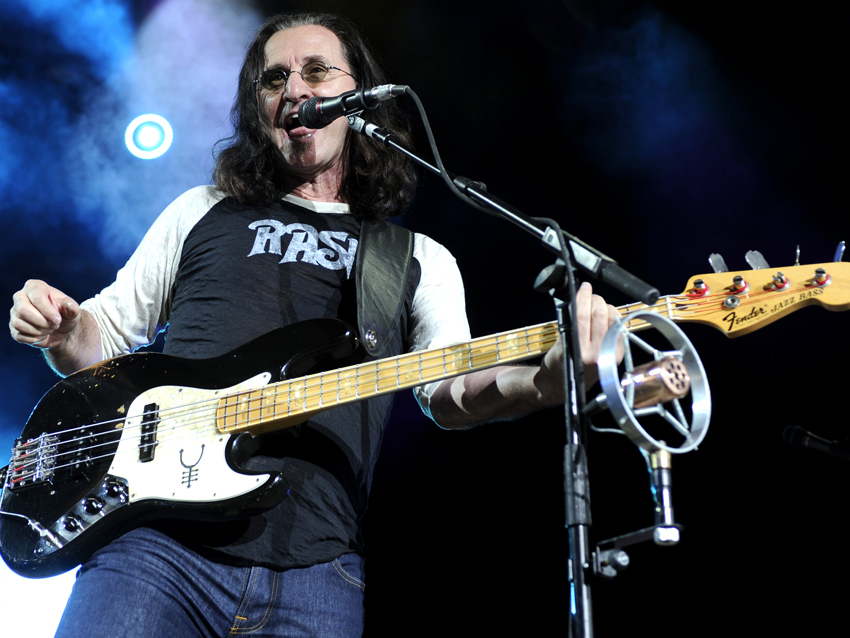
Lee on stage with Rush in Concord, California, 2011. © Tim Mosenfelder/Corbis
What about EPs? Now, Billy, you've had some experience with the format - do you see EPs as being a viable alternative or even a bridge between the single and the album?
Corgan: "No. I've released a couple of EPs lately, and I don't know, it's weird. It's like, I don't know where the delineation point is. There's just something psychological about the idea of an album that arouses the public interest."
Lee: "I would agree with that."
Corgan: "An EP - people almost treat it like a stopgap."
Lee: "Yeah, and what does it mean anyway? I agree in the sense that at least an album is an idea; it feels like a complete idea. So for purposes of discussion and purposes of maintaining your own interests as an artist, it's something you can get your teeth around.
"But an EP's neither here nor there. It's still not what the public wants. I agree with Billy that the form is morphing, and we don't know what it's going to morph into. The general public would prefer one song at a time, I think - but that doesn't mean we have to go along with what they want. [laughs] What the general public desires, I think it still needs to have its artists that decide what's important for them, and that ends up shaping the way people go."
Corgan: "Where it's difficult is, as the public's interest in albums has diminished, it sort of rewards those people who can come up with the one song. You have, in essence, the wrong end of the telescope. It's like guilt by implication. So if you come up with this one song, people think, Oh, this artist is so great!"
Lee: "It's always been like that. That's the history of pop music, really, that one song. And then you've got other people that are trying to make a career instead of worrying about one song."
Back in the day, there were three models: you could be a singles act only, and sometimes that made you a one-hit wonder; or you could be like the Beatles and the Stones and release singles between albums; or you could be like Led Zeppelin and reject the single mentality altogether. Obviously, the first isn't a great option, but given the choice, which model would you prefer?
Lee: "I think that's kind of obvious. We're an album band, and we still believe in that - a group of songs. The way we approached Clockwork Angels was a little bit trying to break the mold by releasing two songs two years before the album was completed. That was our way of saying, 'Does the album itself really matter anymore?' But as soon as we released that, we realized it feels incomplete. It just doesn't work for us. It's nice to do that from time to time, but it's hard for a band like us to exist without the album as its reference point from time to time.
"I don't think the three examples you've given are really historically any different. You've always got different genres of music. For example, look at the jazz artist. And maybe there was a rock artist that would go the way of the jazz artist, where it's a career, it's an artist you're interested in and you want to see what this artist is up to in this period of time. And the rock fan will become one of many branches of that tree. That's kind of the way it's going; it's a very fragmented musical world now."
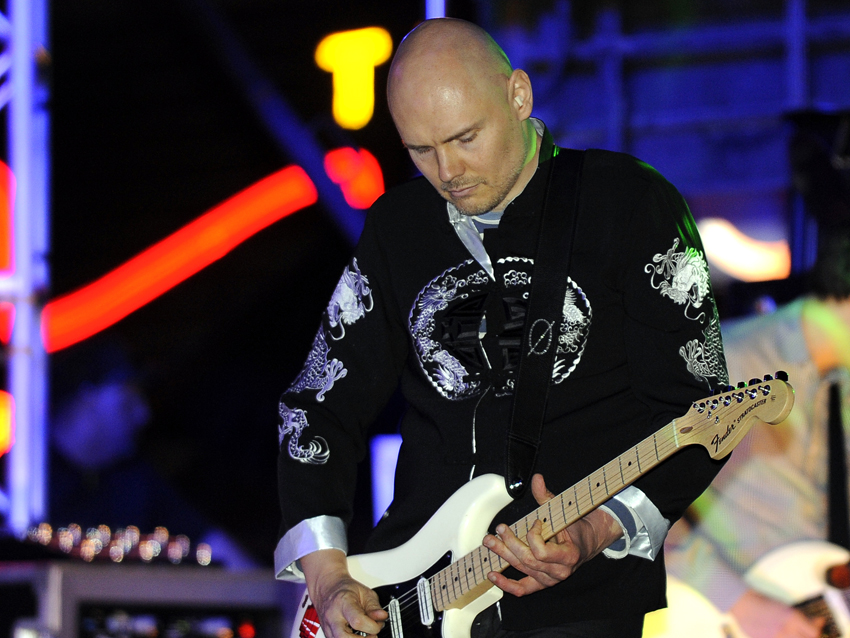
Corgan on stage with The Smashing Pumpkins in West Hollywood, CA, 2010. © Tim Mosenfelder/Corbis
Corgan: "Personally, I prefer the Stones/Beatles model, but I think singles in this particular moment is almost an impossible game for let's call it a 'career artist.' Because the people who are singles-driven and have saturated the market, that's all they do.
"This is not an excuse, and I'm sort of loosely including Geddy and the boys in this - to sit there and figure out your seven-minute song takes a tremendous amount of energy. We do it because we believe in it, and we think it says something about us and our bigger journey and everything. We don't sit in the studio and work with the Pro Tools guy on the three-minute song, and we're stealing the hook from the guy who just had the last hit single, and we're getting the guy who just worked for 3M in the studio.
"I've just been dating somebody who's in the pop world. It's crazy how that world works. They just rotate producers and writers around, and that's all… Not a reflection on my ex, because they were different than that, but that's all they do. That's all they do." [laughs]
Lee: "It's true. I was working in the studio recently with someone who was recording one of the pop artists who shall remain nameless. That pop artist had four different producers on one song. It blew my mind! Someone comes in and produces the beats, someone else produces the music, someone else produces the singing. So it's assembly line music. It's not even the same industry that Billy and I are in."
Corgan: "Alternative music has been infiltrated by this consciousness, so to be somebody who's had great success in alternative radio, and then turn around and have them say, 'Well, your new single just doesn't compete…' Meanwhile, they're still playing my old singles, so I don't know how my new single doesn't compete when it's kind of same-ish. And then they're playing this kind of robot music… I mean, that's why we've veered toward let's call it 'the depth' of what we do.
"And the funny thing is, we didn't talk about singles at all on this record. We didn't even release a single, we haven't even worked a single, and songs are now being picked off the album and being played by the alternative radio stations because they're strong. And for the past few years where we've tried to get traction with radio and tried to work with them and played their radio shows, and hired the independent radio people to work the record, all this crap that they ask you to do, we couldn't get anywhere because it didn't fit into their weird demographic shit."
Lee: "It's kind of an ageism thing. We've experienced that - there's radio stations that won't play a song of ours even though they may love it. They'll say, 'Well, we can't say your band name on our radio station. That's an old name, and our audience doesn't want to hear that name.' So you listen to the stations and they're playing songs by other bands that have been around a while, and they're crap songs. It's such a strange selection process, and the rules that have been written by all these consultants for these different kinds of radio stations, it's bizarre to me. It's not merit-based at all."
Corgan: "Absolutely. That's a great way to put it."
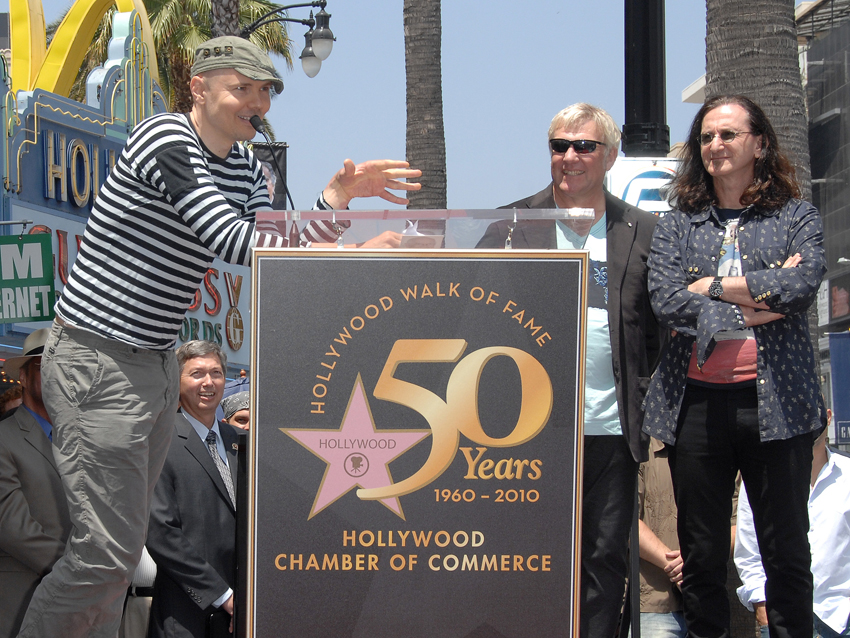
While Alex Lifeson and Geddy Lee look on, Billy Corgan speaks as Rush accept their star on the Hollywood Walk Of Fame, 2010. © RD / Scott Kirkland / Retna Di/Retna Ltd./Corbis
Let's take another point of view here: Do you feel that we might be in some weird cultural stopgap where artists just aren't making great albums? Is it the bands or the culture - the audience - bringing about this shift?
Lee: "That's a big question. [laughs] I don't know if you can blame anyone. It's maybe just a dull part of the cycle. I think, basically, the music industry is scattered and in a mess. I think you've got lots of people that are so-called 'experts' that have no idea where it's headed.
"So nobody knows what to do, and nobody knows who to direct and who to listen to, so consultants are trying to create some form or another, and that's why it keeps changing. I think you just have to cross your fingers that there's enough artists out there that keep producing interesting work, and eventually it will form a kind of wave that will force people to pay attention to it."
Corgan: "To kind of answer your question a little bit differently, I see the rise of the artist-entrepreneur. Amanda Palmer of the Dresden Dolls recently raised a million dollars on a Kickstarter campaign to self-finance her record. In a weird way, that's why my band and Rush are having this - renaissance isn't the right word because we haven't gone away in that way…
"But I think people are interested in people who have their own world. The old system which said, 'Yeah, you guys are good and all that, Rush, but where's the single?' [laughs] And it's like, 'Hey, we're selling out every night to people who don't give a fuck about singles! They love our song The Trees, and that's not a single - but it could be a single if we edited it down to two minutes.'
"I think we're seeing, to use Geddy's words, kind of a merit-based shift, where the audience is going to start finding the artist directly, or the systems will be set up where the artists can be found directly through third parties. Maybe we'll get back to a place where artists will be incentivized that 'Hey, if I bust my ass and I actually stand out on my own - which, of course, is the way to be - I'm actually going to be rewarded. Because the system as it exists now… if you were 20 years old and you wanted to be Smashing Pumpkins now or Rush now, it's almost impossible… impossible to achieve the success that we achieved."
Lee: "The system's not built for it any longer."
Back in the day, fans wrote letters to groups - you'd get them, although it could take a while. Now, artists can go online and there's discussions about what you should and shouldn't be doing. [Corgan laughs] The minute you announce that you're recording an album, thousands of people are telling you what that album should be. How do you react to that?
Corgan: "I'll start with this one - " [laughs]
Lee: "Go ahead." [laughs]

On Clockwork Angels, Lee says that Rush were "chomping at the bit to do something a bit more ambitious." © Tim Mosenfelder/Corbis
Corgan: "'Cause I've been the leading edge of… I basically tell them, to use the English term, to 'sod off.' I understand sentimentality; I fall into it myself, and I have to watch it in myself. But a fan will always just point back to their favorite period. There's a whole host of reasons.
"I once had this conversation with Pete Townshend. I'm paraphrasing what Pete said: 'I can't re-create the situation where they were in the back of the car with their first love and they heard Substitute.' You know what I mean? There's a whole host of factors that cements music to our soul.
"I talk in the Rush documentary about how I was going through a very difficult period in my life, and Entre Nous by Rush, those lyrics were like, 'Wow, this is how I feel!' There was that melding moment, and now, every time I hear that song, I don't really hear that song. You know what I mean? I don't hear it from an objective perspective, I hear it from a very personal perspective. It's almost like it was written for me.
"And so it's hard to re-create those feelings in somebody. They're de facto asking you to re-create the context, and you can't. Then there's that weird thing where you try to evolve. Rush went through this where you try to bring on new technologies, new perspectives, and people are like, 'Oh, I don't like that.' They get sentimental, and they want to hang on to what they know, but the artist intuitively knows that you have to push forward. So I've just taken the opinion to tell people to shove it.
"A band needs to fail, you know what I mean? If we could go back in a time machine, and we could see Rush at some club in 1974, in a bored audience, and them coming off the stage and going, 'You know what? Fuck that. We're not gonna do that, we're gonna do this instead.' Those are the moments where a band sort of galvanizes themselves.
"You have to figure out who you are through the process. In this hyperstate that we're in, I don't see where a young band has a moment to figure that process out because everybody's all over them from the first second. 'Do this, don't do that, oh I like this, I don't like that' - and you're watching your numbers go up and down, you know? I know people who just watch their Twitter numbers. They literally freak out if their Twitter numbers go down!" [laughs]
Lee: [laughs] "Oh my God…"
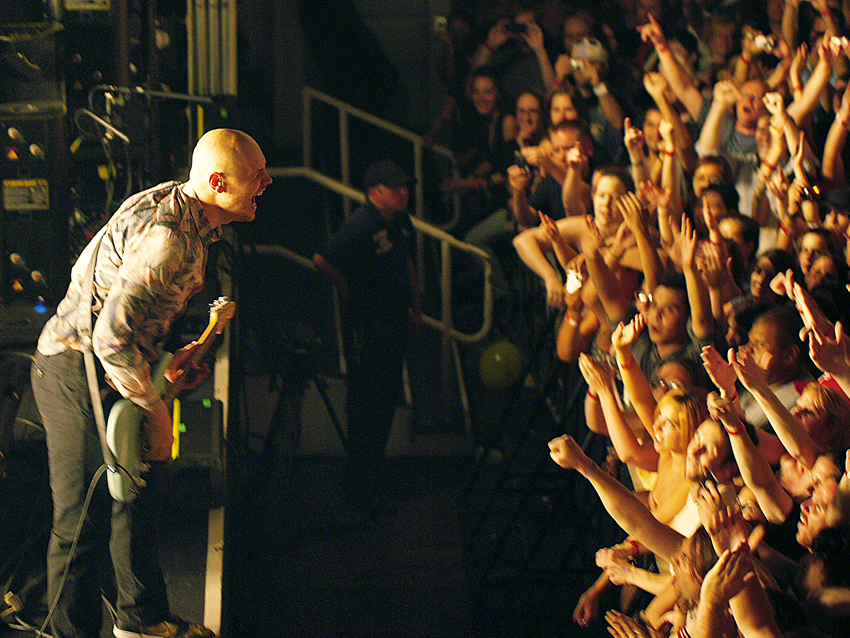
While recording Oceania, Corgan says that the band "didn't talk about singles." © Jen Maler ./Retna Ltd./Corbis
Geddy, I don't get the feeling that you're watching your Twitter count.
Lee: "I don't have a Twitter account. I don't have a Facebook page."
Corgan: "You need to get @Geddy. I'm @Billy."
Lee: [laughs] "OK. What I do is largely stay away from the sites that talk about our band because there's so much chatter that I don't want to be influenced by. Our fans come to see us, and there's a fair exchange going on in that room. I'm working my ass off for them, and they're hearing the songs they want to hear, hopefully, and showing me some love, throwing it back up on stage to me.
"That's the only thing that I can see as part of my job. If I start mining for opinions on hundreds of websites that have fan forums, I'll be totally distored in my view of myself. I'll lose myself in all that."
Corgan: "You're a wise man."
Lee: "I don't want to do that, and I don't want to… I don't want to spoil their fun by - "
Corgan: "I love spoiling their fun! " [everybody laughs]
Lee: " - stopping their conversation. They obviously need to talk to each other, but they don't need me involved."
Corgan: "I love spoiling their party." [everybody laughs]
In the upcoming Part Two, Lee and Corgan discuss the mastering 'loudness wars,' concept albums, the importance of jamming and their signature vocal styles.
Part two of our exclusive Billy Corgan and Geddy Lee interview
Geddy Lee on his five favourite bassists
Joe is a freelance journalist who has, over the past few decades, interviewed hundreds of guitarists for Guitar World, Guitar Player, MusicRadar and Classic Rock. He is also a former editor of Guitar World, contributing writer for Guitar Aficionado and VP of A&R for Island Records. He’s an enthusiastic guitarist, but he’s nowhere near the likes of the people he interviews. Surprisingly, his skills are more suited to the drums. If you need a drummer for your Beatles tribute band, look him up.
"At first the tension was unbelievable. Johnny was really cold, Dee Dee was OK but Joey was a sweetheart": The story of the Ramones' recording of Baby I Love You
"Reggae is more freeform than the blues. But more important, reggae is for everyone": Bob Marley and the Wailers' Catch a Fire, track-by-track

